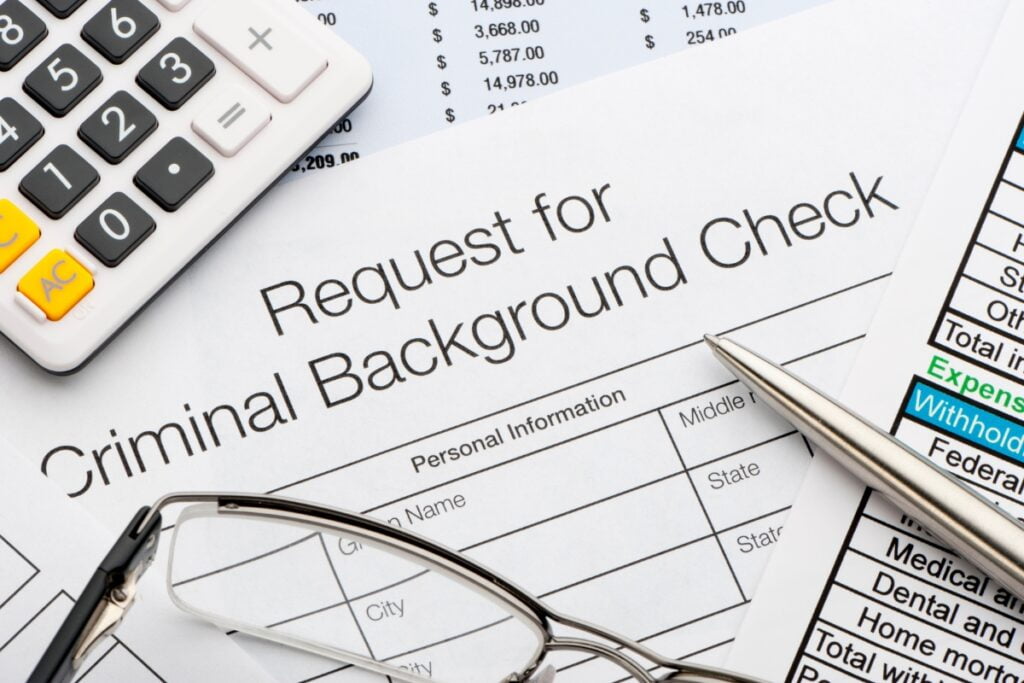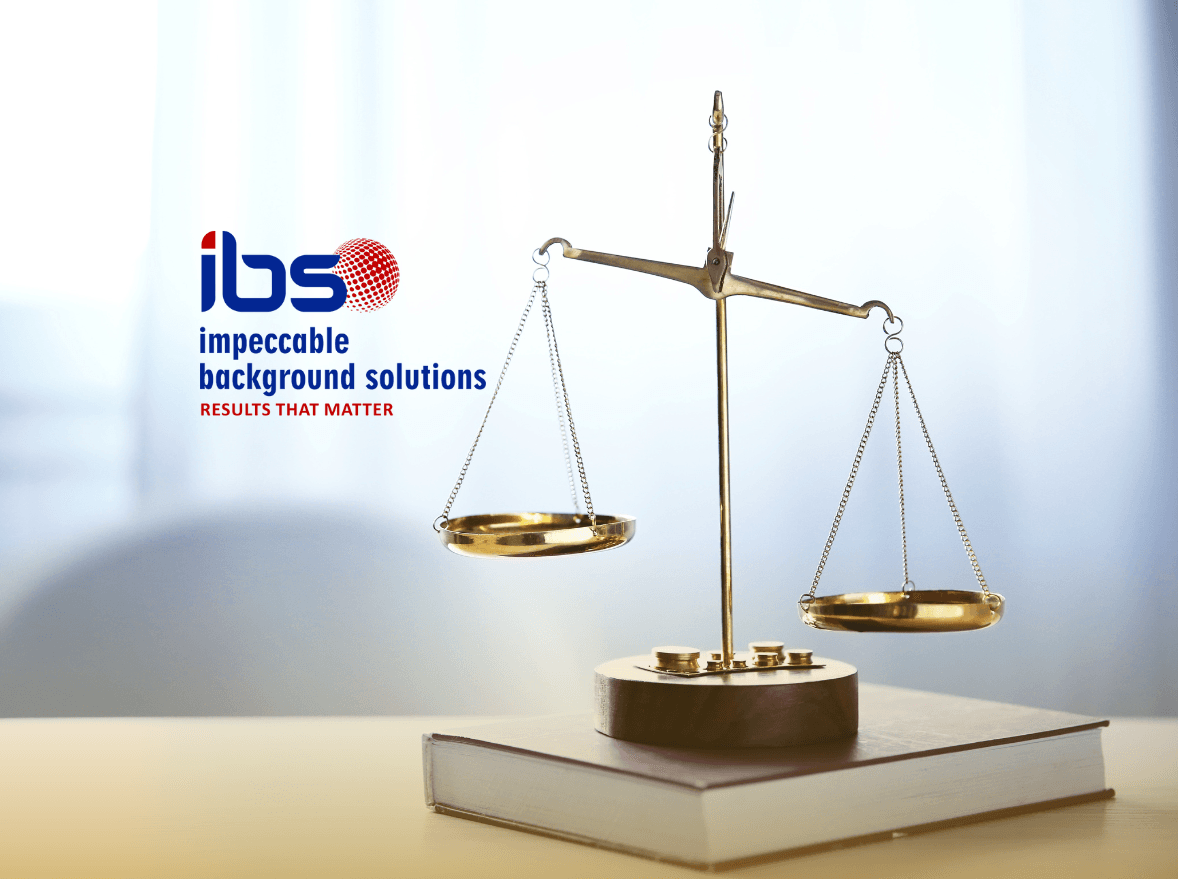Gone are the days where hiring employees simply requires a CV and an in-person interview. In the modern workplace, prescreening is increasingly becoming part of the standard hiring practice.
A background check is an essential part of this process, offering employers a valuable insight on their potential hire. But why are background checks important when hiring an employee?
In this blog post, we take a closer look at why background checks are important when hiring an employee, how to go about running them, and steps you can take to ensure compliance.
Understanding Background Checks and Their Benefits

Background checks are an essential part of the recruitment process and can have a wide range of benefits for employers. Hiring a new employee is a huge commitment and often carries a lot of responsibility. As such, it is important to ensure that the employee is trustworthy and has the right qualifications for the job. Background checks allow employers to verify the information provided by job applicants and to gain an understanding of their past.
Here are some key benefits of conducting background checks when hiring employees:
- Ensuring A Safe Working Environment: Conducting background checks allows employers to gain a greater understanding of an applicant’s criminal history, if any, and helps to ensure that the workplace is safe for all employees. A background check can also provide information on an employee’s previous employment, ensuring that they are fit for the role.
- Deterring Fraud: Background checks help employers to detect any fraudulent activities or false information provided by the applicant. This ensures that the applicant is honest and reliable, and that the employer can trust their judgement.
- Ensuring Compliance With Regulatory Requirements: Background checks are an important part of maintaining compliance with local, state, and federal laws. By conducting a background check, employers can ensure that they are adhering to the applicable laws and regulations.
- Protecting The Employer’s Reputation: When it comes to hiring new employees, employers want to make sure that they are selecting candidates that align with the company’s values and culture. Background checks help employers to make sure that the applicant is suitable for the role and will represent the company in a positive light.
- Building Trust With Consumers: The reputation of the company can also have an impact on its success when it comes to gaining customers. Consumers are more likely to trust a company that is transparent about its hiring practices and takes the necessary steps to ensure that their employees are qualified and trustworthy. The benefits of conducting background checks when hiring an employee are numerous. Not only do they help to ensure the safety of the workplace, but they also help employers to build trust with consumers. Additionally, background checks can help employers to ensure compliance with regulatory requirements and can protect the employer’s reputation.
Common Types of Background Checks

Background checks are an important part of the hiring process, especially when considering the safety of a workplace and the security of confidential information. These checks can often provide employers with the insight they need to make the best decisions when it comes to hiring employees. Below are some of the most common types of background checks used when assessing potential employees:
- Criminal History Check: This type of check is used to verify if a potential employee has a criminal record and if that record would affect their ability to perform the job in question. This background check may include a review of court documents and other public records.
- Credit History Check: A credit history check is used to determine a potential employee’s financial responsibility. This type of check may include a review of a person’s credit score, bank account records, and loan applications.
- Employment History Check: An employment history check is used to verify a potential employee’s past work experience and track record. This type of background check typically requires employers to contact past employers to verify dates of employment and job performance.
- Education History Check: An education history check is used to verify a potential employee’s educational background and qualifications. This type of check usually requires employers to contact educational institutions to verify dates of attendance and degrees obtained.
- Reference Check: A reference check is used to verify a potential employee’s character references. This type of check requires employers to contact the references listed on an applicant’s resume or application and ask questions about the individual’s work ethic and experience.
Guidelines for Legally Completing Background Checks

Hiring the right employees is essential for business success. Employers must abide by the law when completing background checks on potential employees. It is important to understand the guidelines for legally completing background checks when it comes to hiring new employees.
When conducting background checks, employers should ensure that they are not violating any federal or state laws. This means that employers must be aware of any applicable laws in the state or jurisdiction where they are conducting the background check. It is also important to understand any specific requirements that may be applicable to certain job positions or potential employees.
When employers conduct background checks, they should ensure that all information provided is accurate and up-to-date. Employers should also make sure that they are not discriminating against any potential employee based on race, gender, or any other protected class. It is important to make sure that the background check is conducted fairly and equitably.
In addition, employers should make sure that the background checks are conducted in a timely manner. This ensures that the information provided is accurate and up-to-date. It is also important to make sure that the information provided is only used for the purpose of the background check and not for any other purpose.
Furthermore, employers should make sure that all employees are aware of their rights during the background check process. This includes providing employees with the right to review the background check prior to it being processed. Employees should also be given the opportunity to dispute any information that is inaccurate or incomplete.
Finally, employers should also make sure that they are following all applicable federal and state laws when conducting background checks. This includes ensuring that they are complying with the Fair Credit Reporting Act (FCRA) and other relevant laws. This ensures that employers are legally completing background checks and not violating any federal or state laws.
What to Look For in a Background Check

Background checks are a vital part of the hiring process. They allow employers to get a better understanding of the prospective employee’s background and employment history, which can help them make better decisions when it comes to hiring.
When it comes to background checks, employers should look for a few key points. First, employers should assess the individual’s criminal record. This record will provide vital information on whether or not the person has a criminal past that could prevent them from being employed in a certain position.
In addition to a criminal record, employers should also check the potential employee’s credit history. This is important as an employee’s credit score can provide insight into their financial responsibility. Credit history can also provide information on if the individual is in debt, which could lead to financial issues that could affect the workplace.
Finally, employers should look into the individual’s employment history. This will help them understand the person’s previous job experience and how it relates to the current position they are applying for. It’s important to make sure the individual has the proper qualifications for the job and that their employment history does not contain any major gaps.
The Legal Implications of Neglecting to Perform Background Checks

Neglecting to perform background checks when hiring an employee can have serious legal implications for employers. While background checks are an important tool for employers to receive a comprehensive understanding of a potential employee, there are still certain legal implications to consider.
The laws surrounding background checks vary by state, as does the information employers can access and use when making hiring decisions. In many states, employers are only allowed to request criminal records if they are job-related and consistent with business necessity.
Additionally, employers must comply with the Fair Credit Reporting Act (FCRA) when using consumer reports. The FCRA outlines certain procedures employers must follow when requesting a consumer report or using a third-party to conduct the report.
When an employer chooses to forgo or neglects to perform background checks, they may be legally negligent. Negligent hiring occurs when employers fail to perform due diligence when determining if an applicant is suitable for the job. For example, if an employer fails to conduct a background check on an applicant, and that applicant is hired and goes on to commit a crime, the employer may be held legally responsible for not taking the necessary precautions.
Neglecting to perform background checks can also lead to legal discrimination. The Equal Employment Opportunity Commission (EEOC) enforces Title VII of the Civil Rights Act of 1964, which prohibits discrimination in the workplace. Employers should not use background checks to discriminate against applicants on the basis of race, color, religion, sex, or national origin. Employers must also comply with all state and local laws when it comes to discrimination.
When an employer decides to perform a background check, they should take into account the federal and state laws, as well as the FCRA, when doing so. This is essential for employers to remain compliant and avoid legal repercussions. Additionally, employers should take measures to ensure that background checks are conducted in a consistent and fair manner throughout the entire organization.
Final Thoughts on the Importance of Background Checks
When it comes to hiring employees, it’s important for an employer to conduct a background check. Background checks are essential for employers to protect their businesses, but they are also a way for employers to make sure they’re hiring the right person for a job. Background checks provide employers with information such as a person’s criminal history, employment history, and educational background.
They can provide employers with invaluable information about potential employees and help them make informed decisions about who to hire. Background checks also help create a safe and secure work environment.
For a smooth and reliable background check experience for your organization, look no further than Impeccable Background Solutions! We’ve got you covered with our professional services.
Our comprehensive background screening services are here to support businesses and organizations in finding the perfect candidates that fit their unique needs.
Got questions or want to learn more about what we do? Don’t hesitate to reach out through our website’s contact form or give us a call at 404-796-8419. Make the smart choice and go with Impeccable Background Solutions today! We’re excited to assist you.





